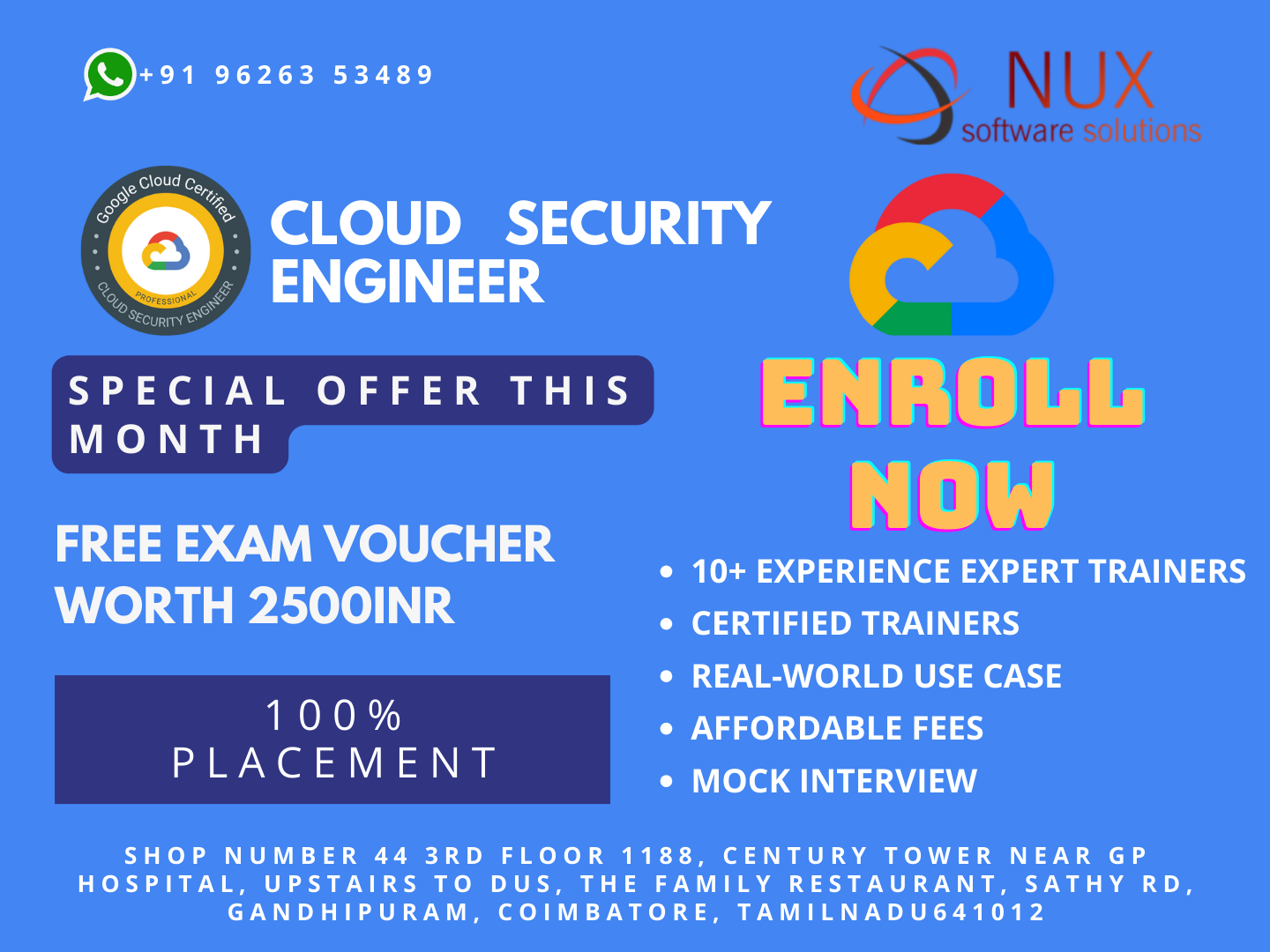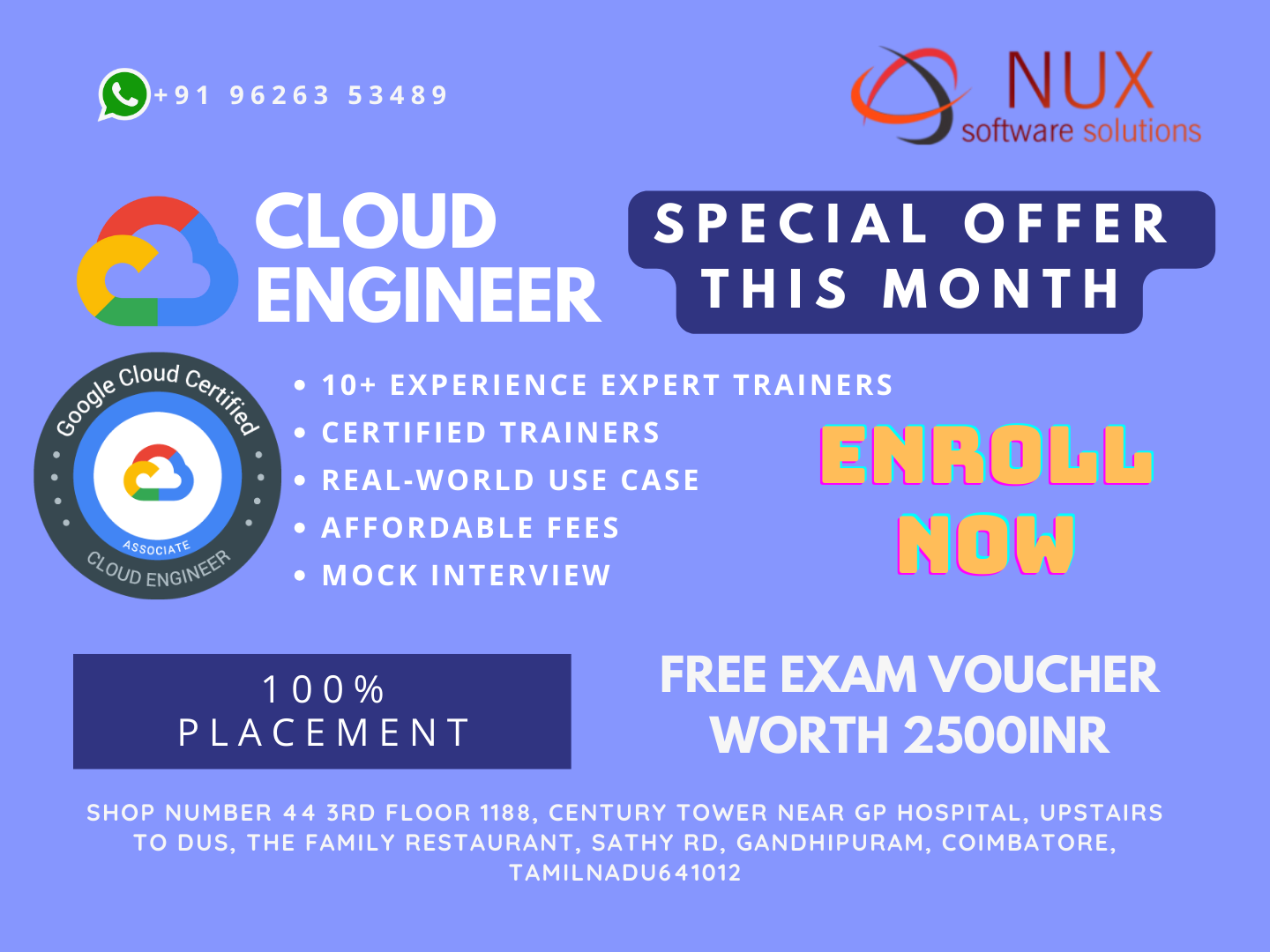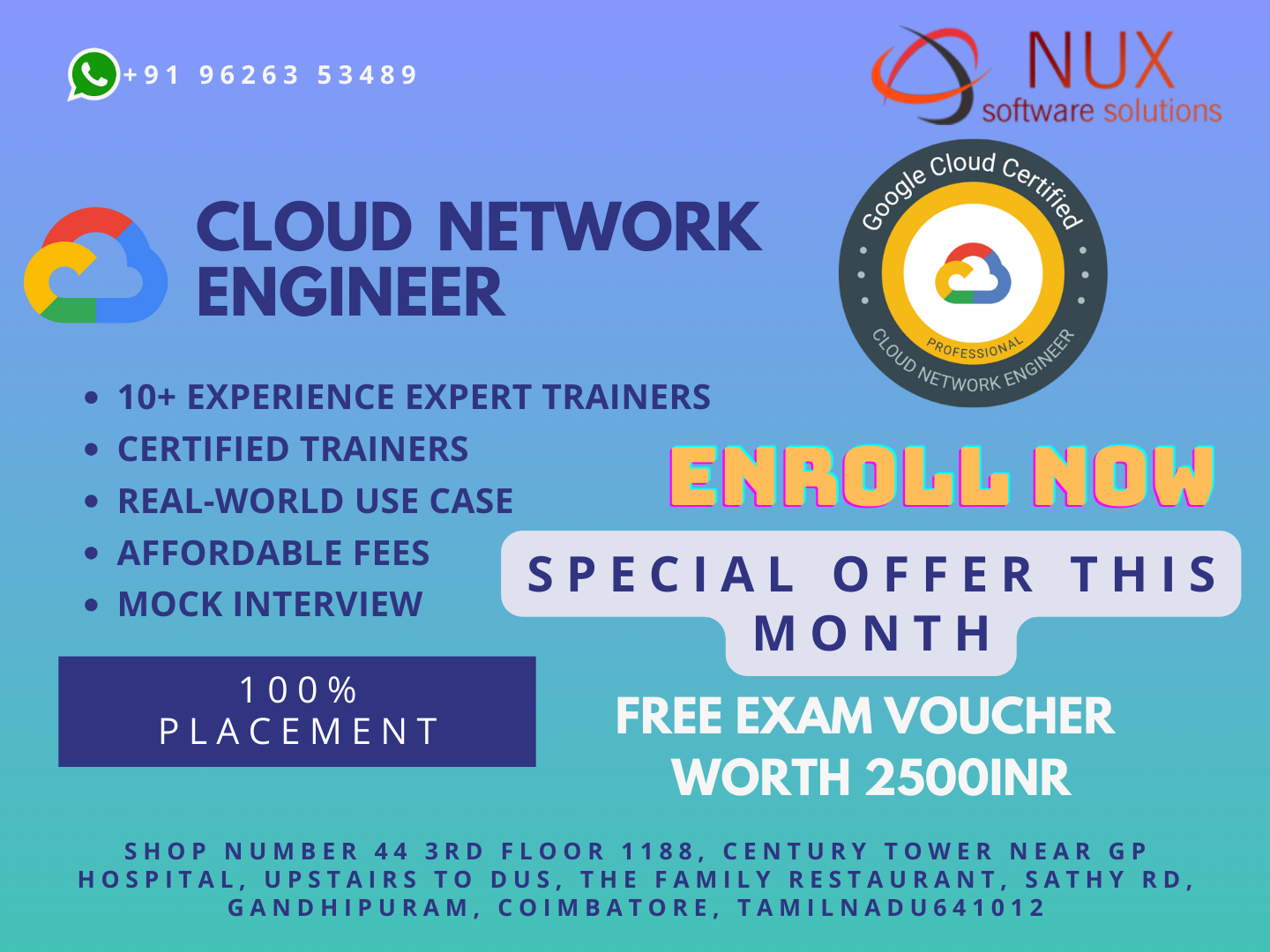Cloud Security Engineer


Best cloud Security Engineer training courses classes deliver by Nux software solutions in coimbatore. Nux software solutions in coimbatore has excellent and advanced training programs that will give you better performance & hands on experience. Our industry’s expert trainers offer a wide range of skills and experience in their graded areas.
The Training center environment is too good for professional, individual, corporate, live project training and industrial training. Labs infrastructure is advanced, well managed and you can access LAB 24X7 from anywhere. Training center has international expert trainers and they have excellent knowledge, real time industry experience.
Our Training programs combine with several innovative learning methods and delivery models. We understand your requirement and it will give you 100 percent growth for your career and provide the cost effective training programs and also work with flexibility for the trainees.
The Google Cloud Security engineer certification was ranked one of the top paying IT certifications of Global Knowledge.
This program provides the skills you need to advance your career as a professional cloud architect and recommends training to support your preparation for the industry-recognized Google Cloud Professional Cloud Architect certification.
You’ll have the opportunity to deploy solution elements, including infrastructure components such as networks, systems and applications services, and you’ll gain real world experience through a number of hands-on Qwiklabs projects.
Upon successful completion of this program, you will earn a certificate of completion to share with your professional network and potential employers. If you would like to become Google Cloud certified and demonstrate your proficiency in the understanding of cloud architecture and Google Cloud Platform, design, develop, and manage solutions to drive business objectives, you will need to register for, and pass the official Google Cloud certification exam. You can find more details on how to register and additional resources to support your preparation at Nux software solutions.
drive business objectives, you will need to register for, and pass the official Google Cloud certification exam. You can find more details on how to register and additional resources to support your preparation at Nux software solutions.
Course Syllabus
Module
Chapter 1.
1.0 Configuring access within a cloud solution environment
1.1 Configuring Cloud Identity. Considerations include:
Managing Cloud Identity, Configuring Google Cloud Directory Sync, Management of super administrator account
1.2 Managing user accounts. Considerations include:
Designing identity roles at the project and organization level, Automation of user lifecycle management process, API usage
1.3 Managing service accounts. Considerations include:
Auditing service accounts and keys, Automating the rotation of user-managed service account keys, Identification of scenarios requiring service accounts, Creating, authorizing, and securing service accounts, Securely managed API access management
1.4 Managing authentication. Considerations include:
Creating a password policy for user accounts, Establishing Security Assertion Markup Language (SAML), Configuring and enforcing two-factor authentication
1.5 Managing and implementing authorization controls. Considerations include:
Using resource hierarchy for access control, Privileged roles and separation of duties, Managing IAM permissions with basic, predefined, and custom roles, Granting permissions to different types of identities, Understanding difference between Google Cloud Storage IAM and ACLs
1.6 Defining resource hierarchy. Considerations include:
Creating and managing organizations, Resource structures (orgs, folders, and projects), Defining and managing organization constraints, Using resource hierarchy for access control and permissions inheritance, Trust and security boundaries within Google Cloud projects
Chapter 2.
2.0 Configuring network security
2.1 Designing network security. Considerations include:
Security properties of a VPC network, VPC peering, shared VPC, and firewall rules, Network isolation and data encapsulation for N tier application design, Use of DNSSEC, Private vs. public addressing, App-to-app security policy
2.2 Configuring network segmentation. Considerations include:
Network perimeter controls (firewall rules; IAP), Load balancing (global, network, HTTP(S), SSL proxy, and TCP proxy load balancers)
2.3 Establish private connectivity. Considerations include:
Private RFC1918 connectivity between VPC networks and Google Cloud projects (Shared VPC, VPC peering), Private RFC1918 connectivity between data centers and VPC network (IPSEC and Cloud Interconnect). Enable private connectivity between VPC and Google APIs (private access)
Chapter 3.
3.0 Ensuring data protection
3.1 Preventing data loss with the DLP API. Considerations include:
Identification and redaction of PII, Configuring tokenization, Configure format preserving substitution, Restricting access to DLP datasets
3.2 Managing encryption at rest. Considerations include:
Understanding use cases for default encryption, customer-managed encryption keys (CMEK), and customer-supplied encryption keys (CSEK), Creating and managing encryption keys for CMEK and CSEK, Managing application secrets, Object lifecycle policies for Cloud Storage, Enclave computing, Envelope encryption
Chapter 4.
4.0 Managing operations within a cloud solution environment
4.1 Building and deploying infrastructure. Considerations include:
Backup and data loss strategy, Creating and automating an incident response plan, Log sinks, audit logs, and data access logs for near-real-time monitoring, Standby models
Automate security scanning for Common Vulnerabilities and Exposures (CVEs) through a CI/CD pipeline, Virtual machine image creation, hardening, and maintenance, Container image creation, hardening, maintenance, and patch management
4.2 Building and deploying applications. Considerations include:
Application logs near-real-time monitoring, Static code analysis, Automate security scanning through a CI/CD pipeline
4.3 Monitoring for security events. Considerations include:
Logging, monitoring, testing, and alerting for security incidents, Exporting logs to external security systems, Automated and manual analysis of access logs, Understanding capabilities of Forseti
Chapter 5.
5.0 Ensuring compliance
5.1 Comprehension of regulatory concerns. Considerations include:
Evaluation of concerns relative to compute, data, and network., Security shared responsibility model, Security guarantees within cloud execution environments, Limiting compute and data for regulatory compliance
5.2 Comprehension of compute environment concerns. Considerations include:
Security guarantees and constraints for each compute environment (Compute Engine, Google Kubernetes Engine, App Engine), Determining which compute environment is appropriate based on company compliance standards


